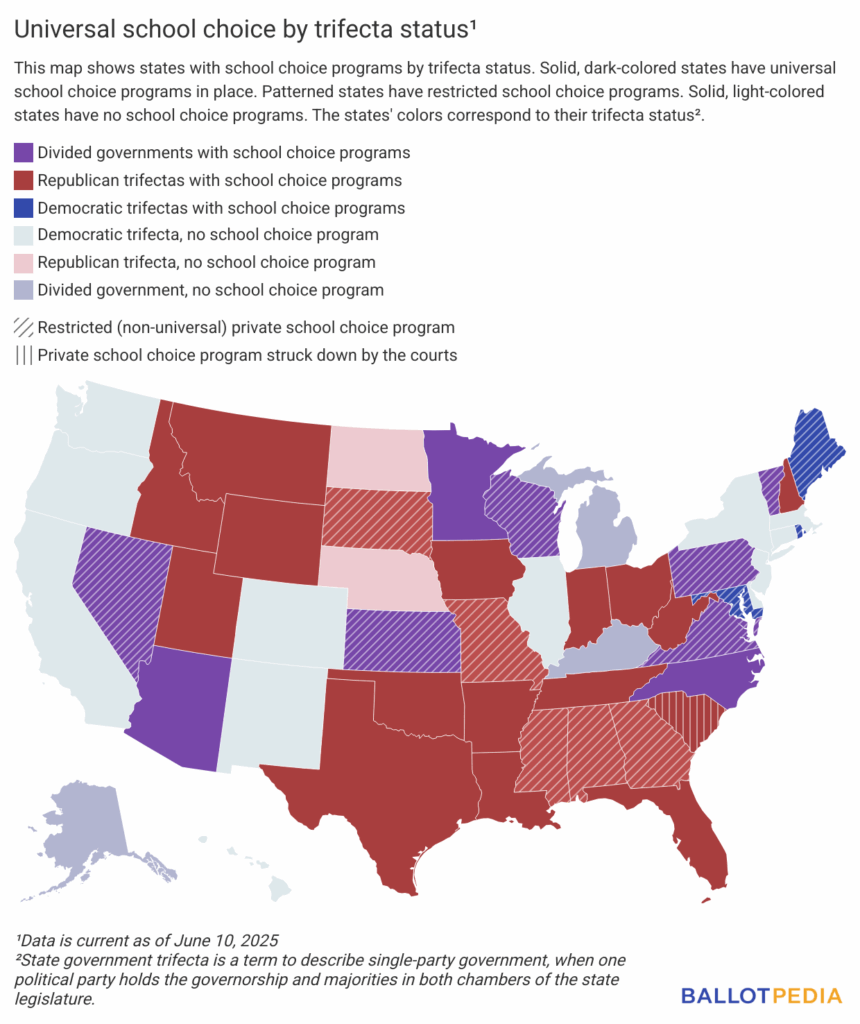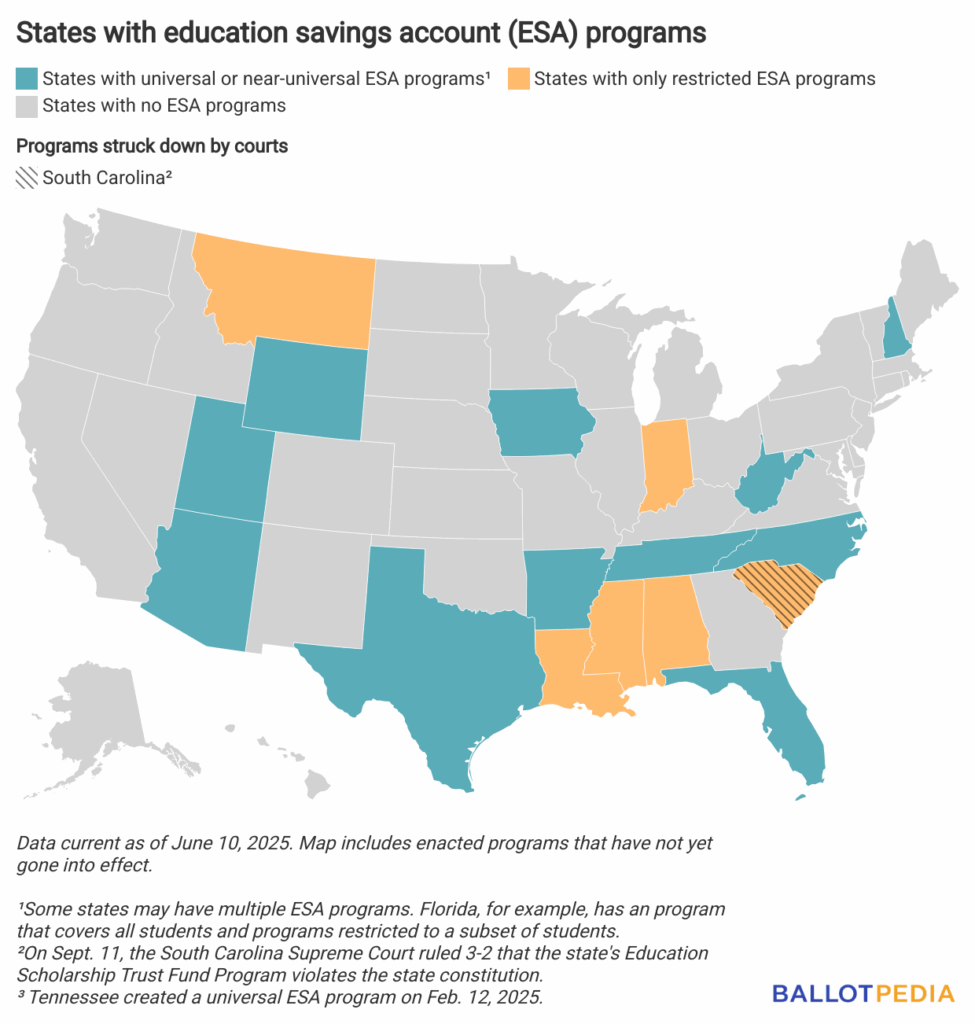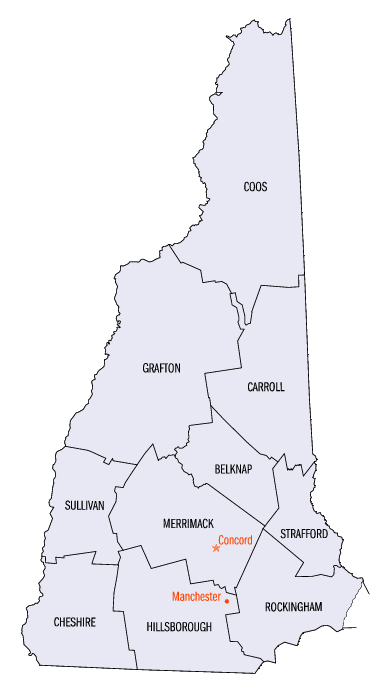New Hampshire Gov. Kelly Ayotte (R) signed Senate Bill 295 on June 10, removing the income threshold from New Hampshire's Education Freedom Account Program (EFA) and making the program universal, meaning all students are eligible to participate. The bill also sets the enrollment cap for the 2025-2026 school year at 10,000 students and creates an order to prioritize which students are admitted if the cap is reached.
New Hampshire’s Education Freedom Account program is an education savings account program that was enacted in 2021. ESAs allow families to receive a deposit of public funds into government-authorized private savings accounts for use on approved educational expenses based on rules set by the state, and families can use ESA money toward things like private school tuition, tutoring, curriculum, and school supplies.
What’s the story
SB 295 eliminates the EFA program’s previous income limit of 350% of federal poverty guidelines for participation in the program. This cap restricted participation in the program to families making less than that amount ($112,500 annually for a family of four in 2025). The median household income in New Hampshire in 2023 was $95,628.
The bill establishes an enrollment cap of 10,000 students for the 2025-2026 fiscal year, and allows a 25 percent increase in the cap for any year that applications reach 90 percent of the existing limit. That threshold of 9,000 students enrolled would expand the program to 12,500 students for the 2026-2027 school year and going forward.
The bill defines a priority system that would admit students in this order if the enrollment cap is reached:
- Current students enrolled in the EFA program
- Siblings of students enrolled in the EFA program
- Students with disabilities as defined in New Hampshire's Administrative Code Section 186-C:2
- Students whose family income is less than or equal to 350% of the federal poverty guidelines
The bill passed the New Hampshire Senate on March 27 by a 16-8 vote, with all Republicans voting in support of the bill and all Democrats voting against it. The bill passed the House on June 5 by a 190-178 vote, with 190 Republicans voting in support and 15 voting against the bill, and all 163 voting Democrats opposing the bill.
The bill was signed by Gov. Ayotte (R) on June 10. New Hampshire has a Republican trifecta.
What's the background
New Hampshire’s Education Freedom Account program is administered by the Children’s Scholarship Fund of New Hampshire (CSF), which distributes grants to families to spend on their children’s education. Parents of an EFA participating student can use funds deposited in their child's EFA for qualifying expenses to educate the child.
Qualifying expenses outlined in New Hampshire Administrative Code Section 194-F:2 include tuition at a school of the parents' choice, tutoring and online learning programs, educational supplies, and technology items. Funds can be used for private, charter, or home schools.
The New Hampshire Department of Education reported approximately 5,300 participants in the program received an average grant of $5,204 per student in the 2024-2025 school year.
Education Commissioner Frank Edelblut said, "…Expanding this opportunity through universal eligibility is a bold and forward-thinking move that reimagines what education can be, providing every student with the opportunity to reach their full potential and experience a bright future. We are proud to support this expansion and eager to see the lasting impact it will have on student success across our state.”
Gov. Ayotte released the following statement after signing the bill into law: “Giving parents the freedom to choose the education setting that best fits their child’s needs will help every student in our state reach their full potential.”
In testimony opposing SB 295, American Federation for Teachers New Hampshire President Deborah Howe argued that similar programs in other states have been harmful, costly, and have not resulted in better academic outcomes or more opportunities for low-income families. She said, "Now is not the time to expand NH school voucher program to be a subsidy available for every family regardless of wealth [...] it certainly is time to look carefully at the NH Legislature finally meeting its constitutional obligation to fully fund our public district schools […] This is what would prepare Granite State children for the workforce, higher education and civic participation in their communities.”
School choice activity in the states
Private school choice programs provide public funds for alternatives to public schools, such as private schools and homeschooling. A universal school choice program means one for which all students are eligible, regardless of family income, location, demographics, or disability.
Eighteen states, including New Hampshire, had universal private school choice programs, and 16 states did not have any private school choice programs as of June 2025. Fifteen of the 18 states with universal school choice were Republican trifectas, and 9 Republican trifectas did not have universal school choice.
In 2025, four states enacted or expanded programs related to private school choice. New Hampshire and Wyoming both passed bills expanding their school choice programs, and Texas and Tennessee enacted programs creating ESA programs in 2025.

Twenty-one states had enacted Education Savings Account (ESA) programs as of June 2025.

Go Deeper:



